James Naismith is best known for his inventing the game of basketball, but he was also a WWI Chaplain. WallBuilders has his chaplain’s sewing kit that also contained crosses.


James Naismith is best known for his inventing the game of basketball, but he was also a WWI Chaplain. WallBuilders has his chaplain’s sewing kit that also contained crosses.

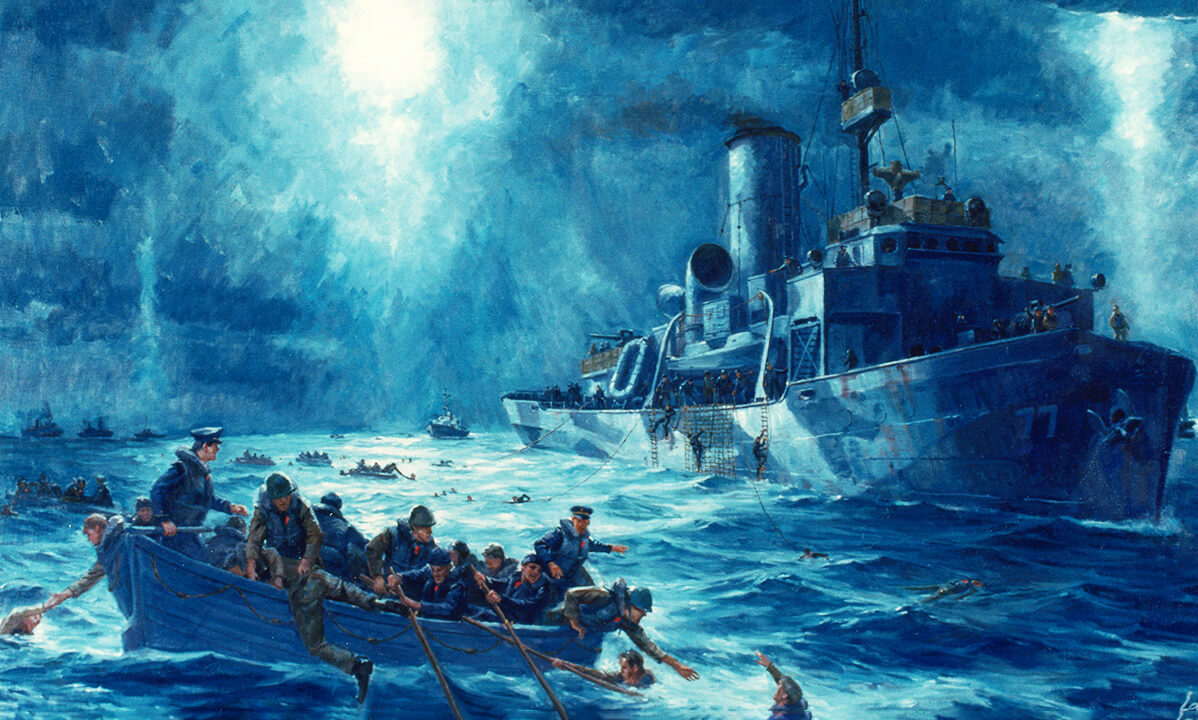
In February, 1943 an American ship, Dorchester, was torpedoed and was sinking. Four chaplains aboard the ship from different denominations and faiths gave life jackets to sailors and provided comfort. Find out more about this remarkable story here.
A Four Chaplains Card signed by Harry Truman in 1960.
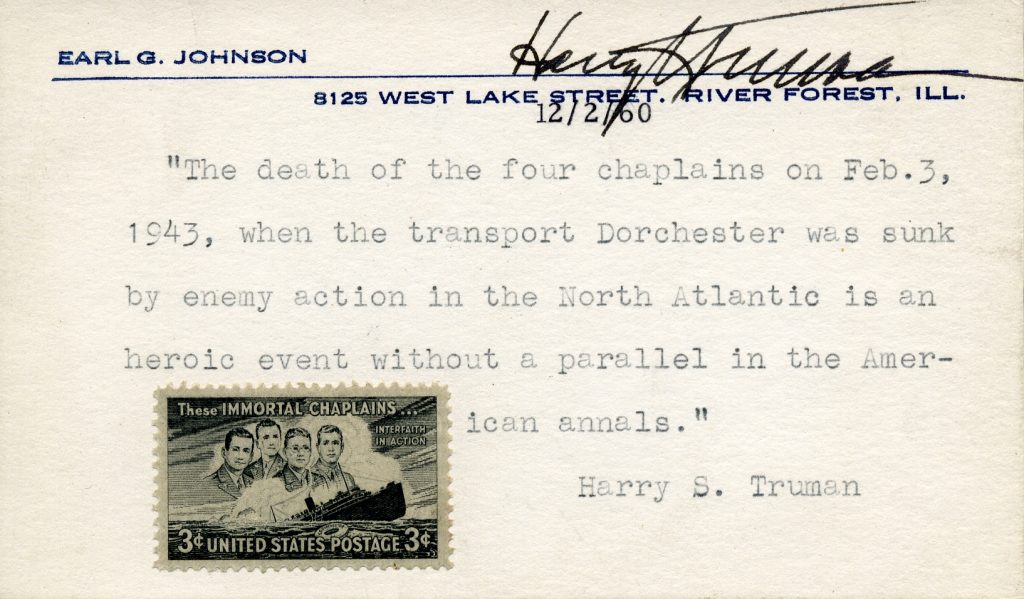
Stamps honored the sacrifice of the four chaplains.
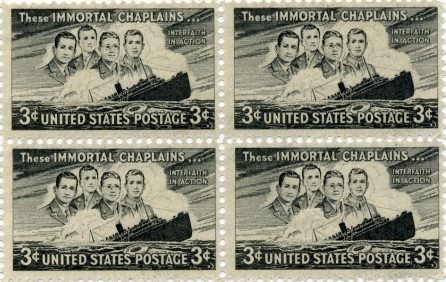
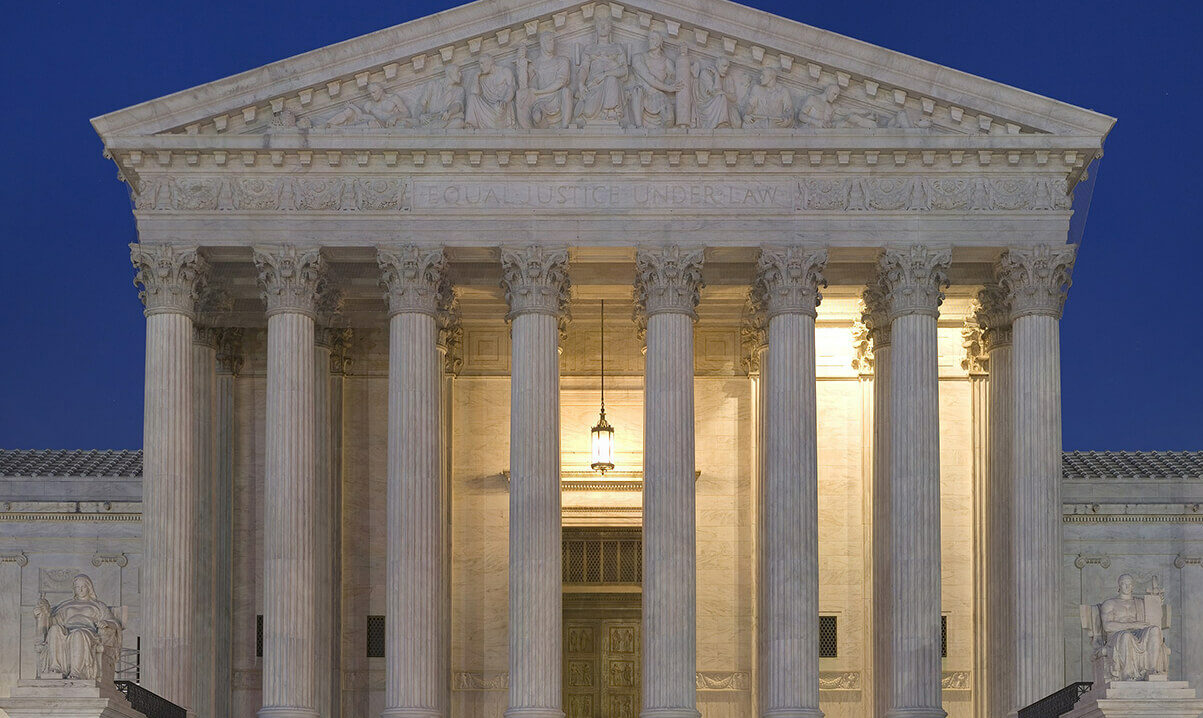
In 1947, in the case Everson v. Board of Education, the Supreme Court declared, “The First Amendment has erected a wall between church and state. That wall must be kept high and impregnable. We could not approve the slightest breach.” The “separation of church and state” phrase which they invoked, and which has today become so familiar, was taken from an exchange of letters between President Thomas Jefferson and the Baptist Association of Danbury, Connecticut, shortly after Jefferson became President.
The election of Jefferson – America’s first Anti-Federalist President – elated many Baptists since that denomination, by-and-large, was also strongly Anti-Federalist. This political disposition of the Baptists was understandable, for from the early settlement of Rhode Island in the 1630s to the time of the federal Constitution in the 1780s, the Baptists had often found themselves suffering from the centralization of power.
Consequently, now having a President who not only had championed the rights of Baptists in Virginia but who also had advocated clear limits on the centralization of government powers, the Danbury Baptists wrote Jefferson a letter of praise on October 7, 1801, telling him:
Among the many millions in America and Europe who rejoice in your election to office, we embrace the first opportunity . . . to express our great satisfaction in your appointment to the Chief Magistracy in the United States. . . . [W]e have reason to believe that America’s God has raised you up to fill the Chair of State out of that goodwill which He bears to the millions which you preside over. May God strengthen you for the arduous task which providence and the voice of the people have called you. . . . And may the Lord preserve you safe from every evil and bring you at last to his Heavenly Kingdom through Jesus Christ our Glorious Mediator.1
However, in that same letter of congratulations, the Baptists also expressed to Jefferson their grave concern over the entire concept of the First Amendment, including of its guarantee for “the free exercise of religion”:
Our sentiments are uniformly on the side of religious liberty: that religion is at all times and places a matter between God and individuals, that no man ought to suffer in name, person, or effects on account of his religious opinions, [and] that the legitimate power of civil government extends no further than to punish the man who works ill to his neighbor. But sir, our constitution of government is not specific. . . . [T]herefore what religious privileges we enjoy (as a minor part of the State) we enjoy as favors granted, and not as inalienable rights.2
In short, the inclusion of protection for the “free exercise of religion” in the constitution suggested to the Danbury Baptists that the right of religious expression was government-given (thus alienable) rather than God-given (hence inalienable), and that therefore the government might someday attempt to regulate religious expression. This was a possibility to which they strenuously objected-unless, as they had explained, someone’s religious practice caused him to “work ill to his neighbor.”
Jefferson understood their concern; it was also his own. In fact, he made numerous declarations about the constitutional inability of the federal government to regulate, restrict, or interfere with religious expression. For example:
[N]o power over the freedom of religion . . . [is] delegated to the United States by the Constitution. Kentucky Resolution, 17983
In matters of religion, I have considered that its free exercise is placed by the Constitution independent of the powers of the general [federal] government. Second Inaugural Address, 18054
[O]ur excellent Constitution . . . has not placed our religious rights under the power of any public functionary. Letter to the Methodist Episcopal Church, 18085
I consider the government of the United States as interdicted [prohibited] by the Constitution from intermeddling with religious institutions . . . or exercises. Letter to Samuel Millar, 18086
Jefferson believed that the government was to be powerless to interfere with religious expressions for a very simple reason: he had long witnessed the unhealthy tendency of government to encroach upon the free exercise of religion. As he explained to Noah Webster:
It had become an universal and almost uncontroverted position in the several States that the purposes of society do not require a surrender of all our rights to our ordinary governors . . . and which experience has nevertheless proved they [the government] will be constantly encroaching on if submitted to them; that there are also certain fences which experience has proved peculiarly efficacious [effective] against wrong and rarely obstructive of right, which yet the governing powers have ever shown a disposition to weaken and remove. Of the first kind, for instance, is freedom of religion.7
Thomas Jefferson had no intention of allowing the government to limit, restrict, regulate, or interfere with public religious practices. He believed, along with the other Founders, that the First Amendment had been enacted only to prevent the federal establishment of a national denomination – a fact he made clear in a letter to fellow-signer of the Declaration of Independence Benjamin Rush:
[T]he clause of the Constitution which, while it secured the freedom of the press, covered also the freedom of religion, had given to the clergy a very favorite hope of obtaining an establishment of a particular form of Christianity through the United States; and as every sect believes its own form the true one, every one perhaps hoped for his own, but especially the Episcopalians and Congregationalists. The returning good sense of our country threatens abortion to their hopes and they believe that any portion of power confided to me will be exerted in opposition to their schemes. And they believe rightly.8
Jefferson had committed himself as President to pursuing the purpose of the First Amendment: preventing the “establishment of a particular form of Christianity” by the Episcopalians, Congregationalists, or any other denomination.
Since this was Jefferson’s view concerning religious expression, in his short and polite reply to the Danbury Baptists on January 1, 1802, he assured them that they need not fear; that the free exercise of religion would never be interfered with by the federal government. As he explained:
Gentlemen, – The affectionate sentiments of esteem and approbation which you are so good as to express towards me on behalf of the Danbury Baptist Association give me the highest satisfaction. . . . Believing with you that religion is a matter which lies solely between man and his God; that he owes account to none other for his faith or his worship; that the legislative powers of government reach actions only and not opinions, I contemplate with sovereign reverence that act of the whole American people which declared that their legislature should “make no law respecting an establishment of religion or prohibiting the free exercise thereof,” thus building a wall of separation between Church and State. Adhering to this expression of the supreme will of the nation in behalf of the rights of conscience, I shall see with sincere satisfaction the progress of those sentiments which tend to restore to man all his natural rights, convinced he has no natural right in opposition to his social duties. I reciprocate your kind prayers for the protection and blessing of the common Father and Creator of man, and tender you for yourselves and your religious association assurances of my high respect and esteem.9
Jefferson’s reference to “natural rights” invoked an important legal phrase which was part of the rhetoric of that day and which reaffirmed his belief that religious liberties were inalienable rights. While the phrase “natural rights” communicated much to people then, to most citizens today those words mean little.
By definition, “natural rights” included “that which the Books of the Law and the Gospel do contain.”10 That is, “natural rights” incorporated what God Himself had guaranteed to man in the Scriptures. Thus, when Jefferson assured the Baptists that by following their “natural rights” they would violate no social duty, he was affirming to them that the free exercise of religion was their inalienable God-given right and therefore was protected from federal regulation or interference.
So clearly did Jefferson understand the Source of America’s inalienable rights that he even doubted whether America could survive if we ever lost that knowledge. He queried:
And can the liberties of a nation be thought secure if we have lost the only firm basis, a conviction in the minds of the people that these liberties are the gift of God? That they are not to be violated but with His wrath?11
Jefferson believed that God, not government, was the Author and Source of our rights and that the government, therefore, was to be prevented from interference with those rights. Very simply, the “fence” of the Webster letter and the “wall” of the Danbury letter were not to limit religious activities in public; rather they were to limit the power of the government to prohibit or interfere with those expressions.
Earlier courts long understood Jefferson’s intent. In fact, when Jefferson’s letter was invoked by the Supreme Court (only twice prior to the 1947 Everson case – the Reynolds v. United States case in 1878), unlike today’s Courts which publish only his eight-word separation phrase, that earlier Court published Jefferson’s entire letter and then concluded:
Coming as this does from an acknowledged leader of the advocates of the measure, it [Jefferson’s letter] may be accepted almost as an authoritative declaration of the scope and effect of the Amendment thus secured. Congress was deprived of all legislative power over mere [religious] opinion, but was left free to reach actions which were in violation of social duties or subversive of good order. (emphasis added)12
That Court then succinctly summarized Jefferson’s intent for “separation of church and state”:
[T]he rightful purposes of civil government are for its officers to interfere when principles break out into overt acts against peace and good order. In th[is] . . . is found the true distinction between what properly belongs to the church and what to the State.13
With this even the Baptists had agreed; for while wanting to see the government prohibited from interfering with or limiting religious activities, they also had declared it a legitimate function of government “to punish the man who works ill to his neighbor.”
That Court, therefore, and others (for example, Commonwealth v. Nesbit and Lindenmuller v. The People), identified actions into which – if perpetrated in the name of religion – the government did have legitimate reason to intrude. Those activities included human sacrifice, polygamy, bigamy, concubinage, incest, infanticide, parricide, advocation and promotion of immorality, etc.
Such acts, even if perpetrated in the name of religion, would be stopped by the government since, as the Court had explained, they were “subversive of good order” and were “overt acts against peace.” However, the government was never to interfere with traditional religious practices outlined in “the Books of the Law and the Gospel” – whether public prayer, the use of the Scriptures, public acknowledgements of God, etc.
Therefore, if Jefferson’s letter is to be used today, let its context be clearly given – as in previous years. Furthermore, earlier Courts had always viewed Jefferson’s Danbury letter for just what it was: a personal, private letter to a specific group. There is probably no other instance in America’s history where words spoken by a single individual in a private letter – words clearly divorced from their context – have become the sole authorization for a national policy. Finally, Jefferson’s Danbury letter should never be invoked as a stand-alone document. A proper analysis of Jefferson’s views must include his numerous other statements on the First Amendment.
For example, in addition to his other statements previously noted, Jefferson also declared that the “power to prescribe any religious exercise. . . . must rest with the States” (emphasis added). Nevertheless, the federal courts ignore this succinct declaration and choose rather to misuse his separation phrase to strike down scores of State laws which encourage or facilitate public religious expressions. Such rulings against State laws are a direct violation of the words and intent of the very one from whom the courts claim to derive their policy.
One further note should be made about the now infamous “separation” dogma. The Congressional Records from June 7 to September 25, 1789, record the months of discussions and debates of the ninety Founding Fathers who framed the First Amendment. Significantly, not only was Thomas Jefferson not one of those ninety who framed the First Amendment, but also, during those debates not one of those ninety Framers ever mentioned the phrase “separation of church and state.” It seems logical that if this had been the intent for the First Amendment – as is so frequently asserted-then at least one of those ninety who framed the Amendment would have mentioned that phrase; none did.
In summary, the “separation” phrase so frequently invoked today was rarely mentioned by any of the Founders; and even Jefferson’s explanation of his phrase is diametrically opposed to the manner in which courts apply it today. “Separation of church and state” currently means almost exactly the opposite of what it originally meant.
1 Letter of October 7, 1801, from Danbury (CT) Baptist Association to Thomas Jefferson, from the Thomas Jefferson Papers Manuscript Division, Library of Congress, Washington, D. C.
2 Id.
3 The Jeffersonian Cyclopedia, ed. John P. Foley (New York: Funk & Wagnalls, 1900), 977; Documents of American History, ed. Henry S. Cummager (NY: Appleton-Century-Crofts, Inc., 1948), 179.
4 March 4, 1805, Annals of the Congress of the United States (Washington: Gales and Seaton, 1852), Eighth Congress, Second Session, 78; James D. Richardson, A Compilation of the Messages and Papers of the Presidents, 1789-1897 (Published by Authority of Congress, 1899), I:379.
5 Thomas Jefferson, March 4, 1805, Writings of Thomas Jefferson, ed. Albert Ellery Bergh (Washington D. C.: The Thomas Jefferson Memorial Association, 1904), I:379.
6 Thomas Jefferson to the Rev. Samuel Millar, January 23, 1808, Memoir, Correspondence, and Miscellanies, From the Papers of Thomas Jefferson, ed. Thomas Jefferson Randolph (Boston: Gray and Bowen, 1830), IV:103-104.
7 Jefferson to Noah Webster, December 4, 1790, Writings, VIII:112-113.
8 Jefferson to Benjamin Rush, September 23, 1800, Writings, III:441.
9 Jefferson to the Danbury Baptist Association, January 1, 1802, Writings, XVI:281-282.
10 Richard Hooker, The Works of Richard Hooker (Oxford: University Press, 1845), I:207.
11 Thomas Jefferson, Notes on the State of Virginia (Philadelphia: Matthew Carey, 1794), 237.
12 Reynolds v. U. S., 98 U.S. 145, 164 (1878).
13 Reynolds at 163.
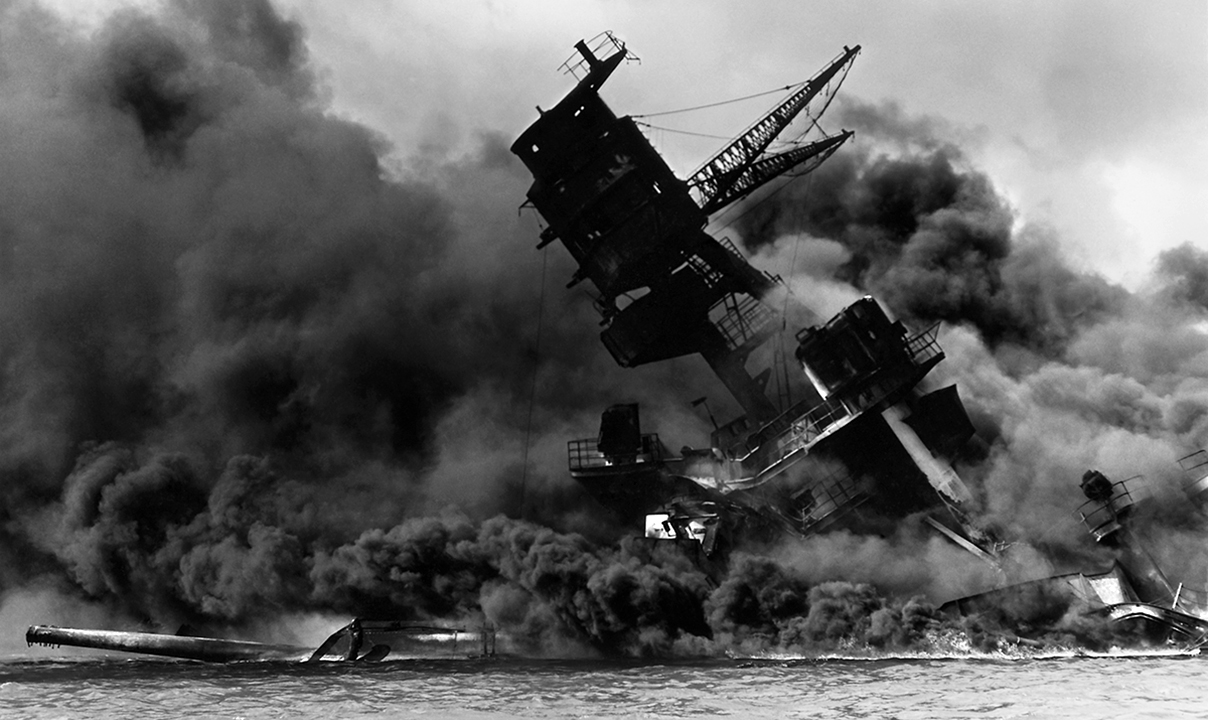
During World War II, American bombers dropped millions of leaflets over Japan to warn citizens of events such as upcoming bombings and surrender terms. Below is a collection of Japanese language leaflets from the WallBuilders library (translations have been provided when found).
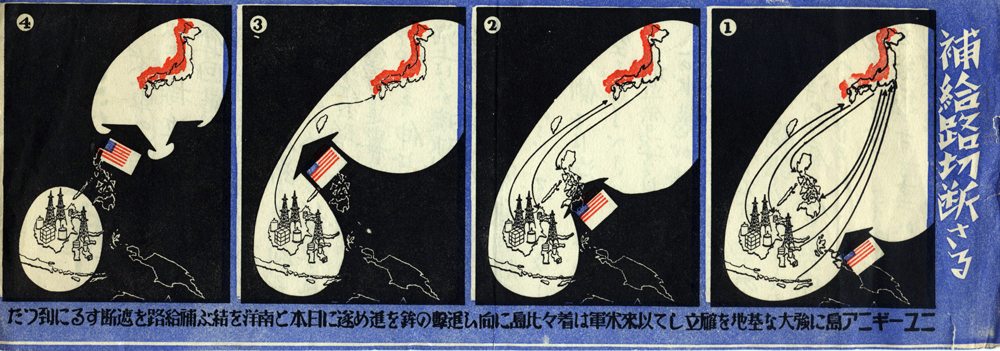
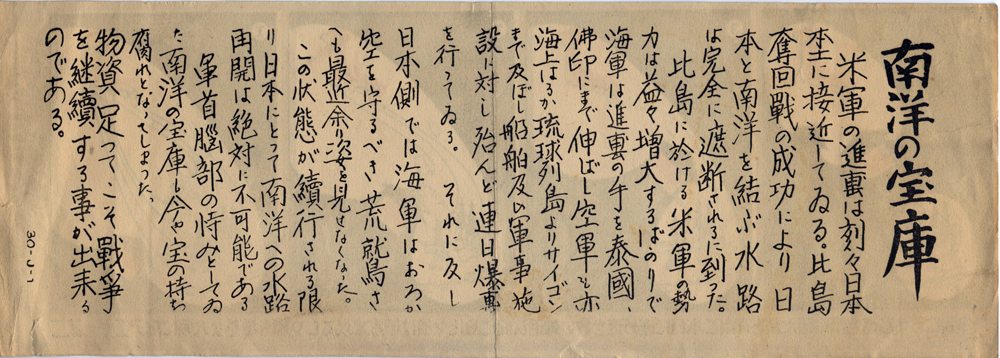
Translation of text on the front:
After establishing strange bases in New Guinea, the American forces made their advance to the Philippines and finally cut the supply lines which link Japan with the Southern Regions.
Translation of text on the back:
Treasure trove of the South Seas
The U.S. military is advancing into Japan every moment. It’s getting close to distortion. Due to the success of the battle to recapture Hishima, Japan the waterway linking Japan to the Southern Ocean was completely cut off. As the strength of the US military in the Philippines continues to grow, the navy extends its influence to Thailand, France, and France, and the air force and the US military extend their influence by sea from the Ryukyu Islands to Saigon, attacking ships and military facilities. On the other hand, on the Japanese side, not only the navy, but the sky is the one that should be protected. As long as this situation continues, it will be absolutely impossible for Japan to reopen the waterway to the South Seas. Only by having enough supplies could the war be continued.
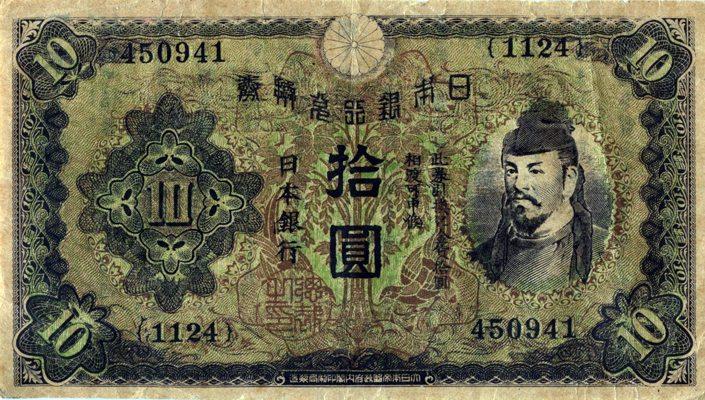
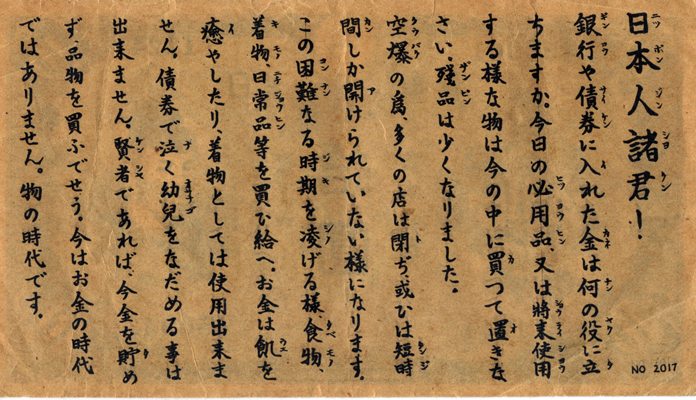
Translation of text on the back:
What good is money in the bank or in bonds? Buy articles you need now and buy articles for future use. The remaining supply is low. As a result of bombing by America, many of your stores will close their doors while others will be open only for limited periods. Buy food, clothing, and other necessities to tide you over these periods. Money will not satisfy your hunger or clothe you. Bonds will not satisfy a baby’s cry. A wise person would buy now, not save his money. The present is not a time for money. It is a period for goods.
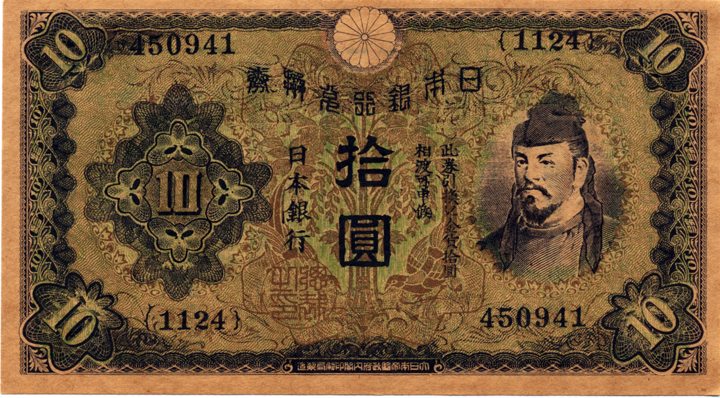
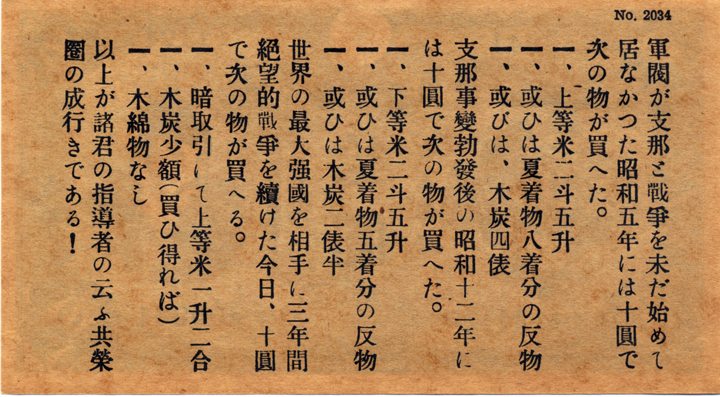
Translation of text on the back:
In 1930, when the gumbatsu [a name for a “militarist clique” in Japan] had not yet started the war in China, you could buy the following items for 10 yen: 1) 25 sho of good rice. 2) Or, material for 8 summer kimonos. 3) Or, 4 bags of charcoal. In 1937, after the start of the China Incident, you could buy the following for 10 yen: 1) 25 sho of low grade rice. 2) Or, material for 5 summer kimonos. 3) Or, 2 bags of charcoal. Today, after waging 3 years of hopeless warfare with the world’s greatest powers, you can buy the following for 10 yen: 1) 1.2 sho of good rice on the black market. 2) Or small amount of charcoal, if you can get it. 3) Cotton material, nothing. This is what your leaders call co-prosperity.
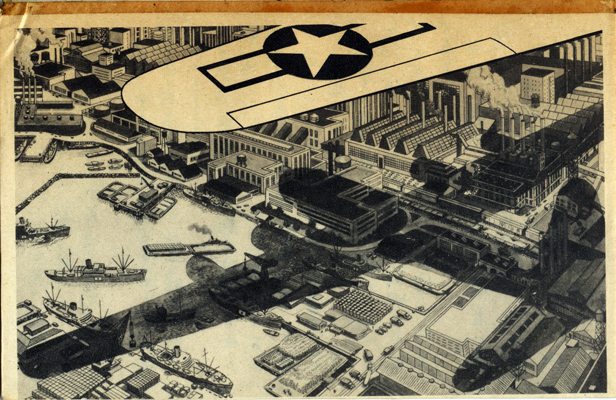
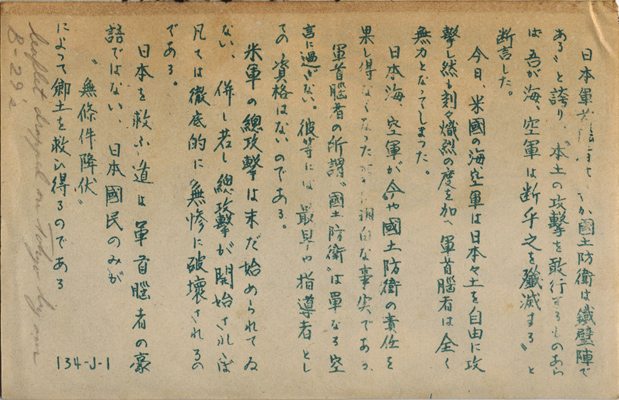
Translation of text on the back:
Boasting that their defense was an iron wall, the militarists asserted that the Japanese Navy and Air Force would annihilate all who attacked the homeland. Today, those militarists stand powerless while the U.S. Navy and Air Force attack Japan at will and with increasing fury. It is clear that the Japanese Navy and Air Force cannot defend the homeland. It is also clear that the militarists, whose so-called defense was merely an empty word, are not worthy to be leaders. The full force of the American attack has not yet been felt. When it comes, the destruction will be pitiless and complete. The militarists cannot save Japan by their boasts, but the people can save their country by unconditional surrender.
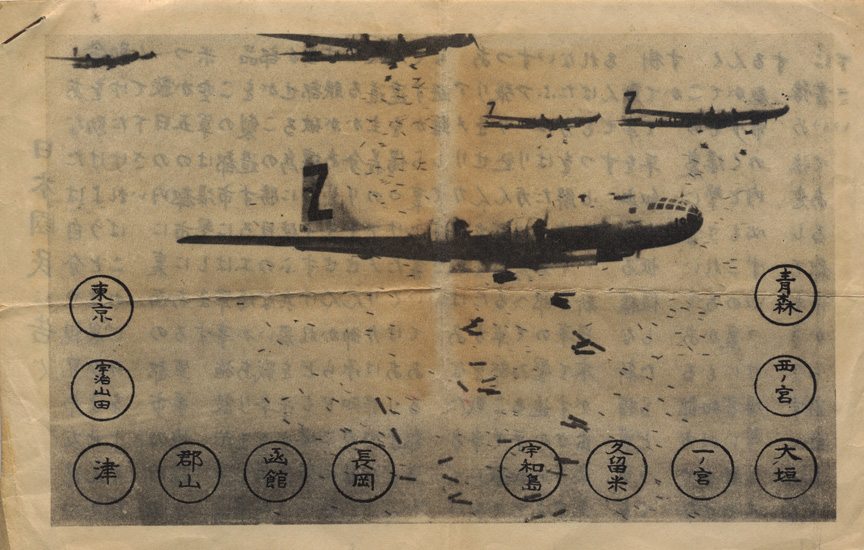
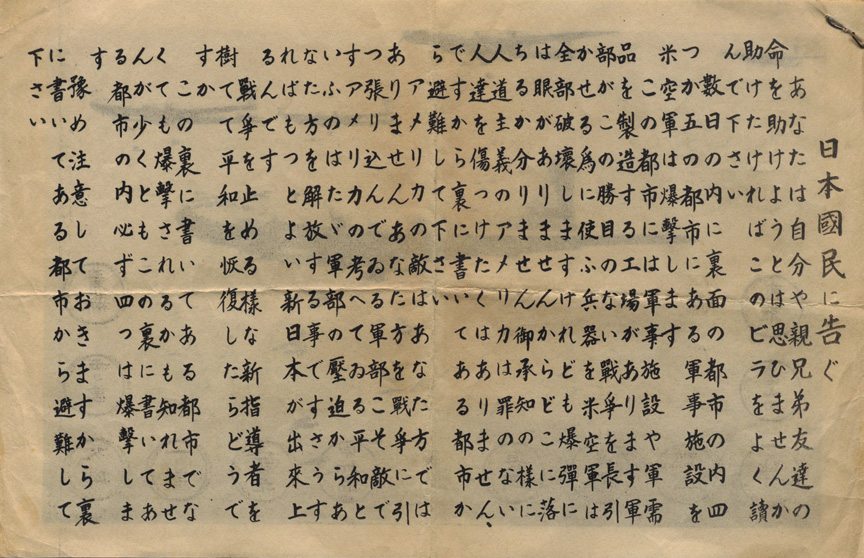
The translation of the above leaflet is found below (right click on the image to view a larger version).
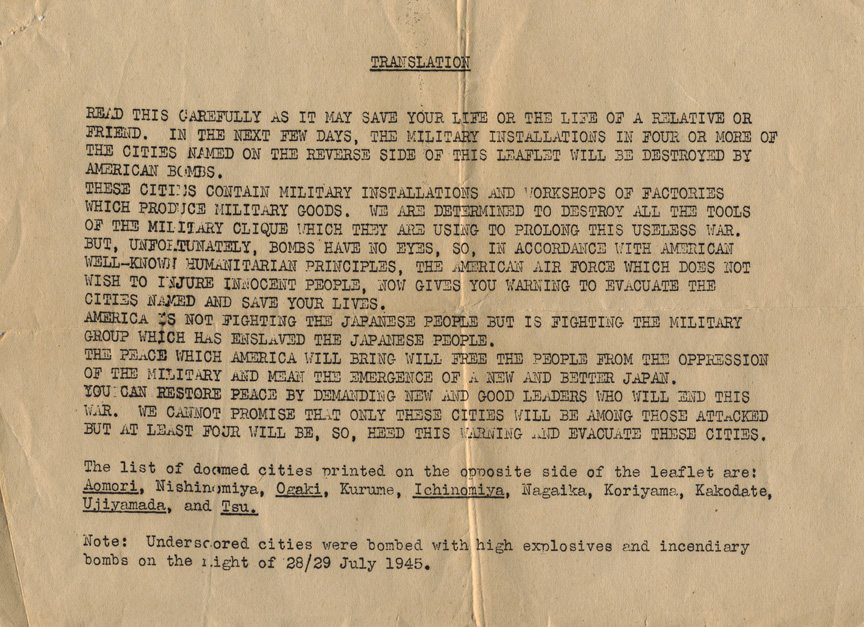
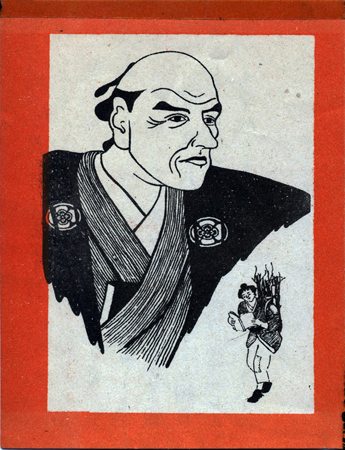
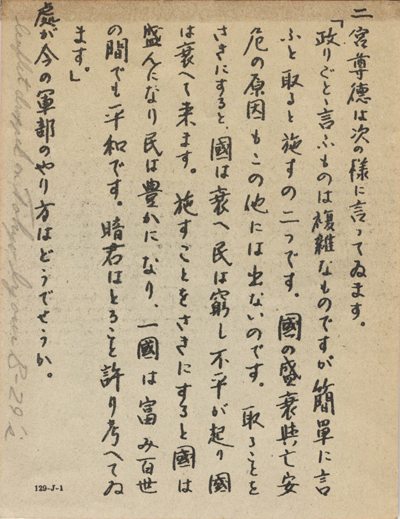
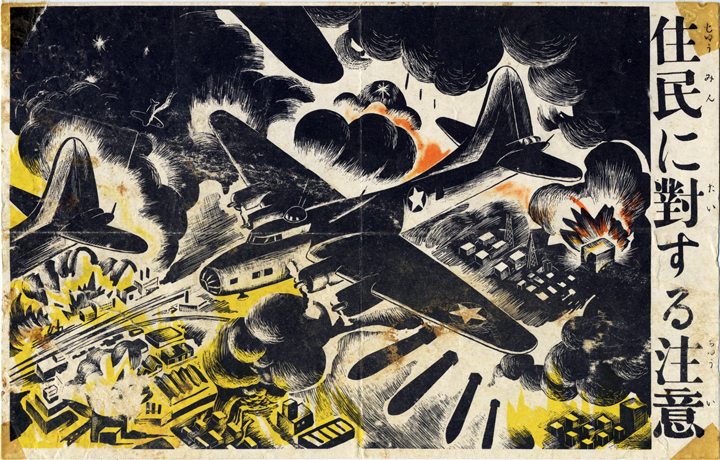
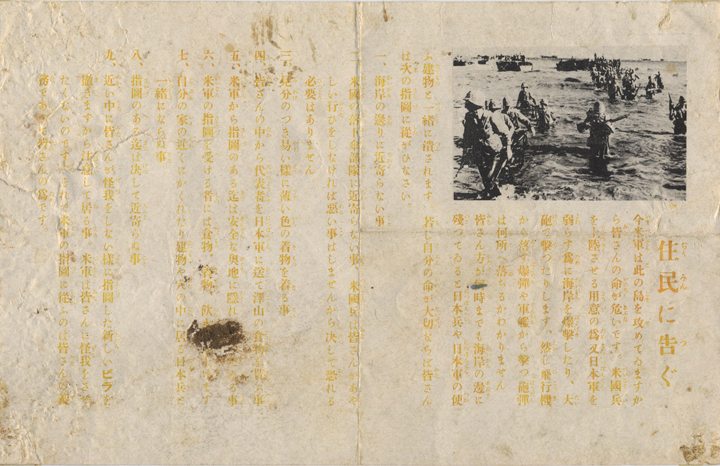
Translation of text on the back:
Now that American forces are invading your island, your lives are in danger. Beaches will be bombed and shelled in order to weaken the Japanese Army and prepare for American troop landings. However, bombs dropped from planes and shells from battlehsips may land anywhere. Civilians who remain in coastal areas will be destroyed together with Japanese soldiers and installations used by the Japanese Army. If you value your lives, follow these instructions: 1. Stay away from all coastal areas. 2. Stay away from American parachute troops. If you make no signs of resistance, they will not harm you. 3. Wear light colored clothing so that you may be easily identified. 4. Send some representatives to obtain food and water from the Japanese Army. 5. Until further instructions are issued from the American forces, withdraw and seek safety. 6. Those who obey our instructions will get food, clothing and water. 7. Do not hide near your homes or join the Japanese soldiers in caves or houses. 8. Do not approach us until instruction is given. 9. Watch for later leaflets which will tell you how to avoid harm. The American troops do not want to harm you. Therefore it is your duty and to your benefit to follow these instructions.
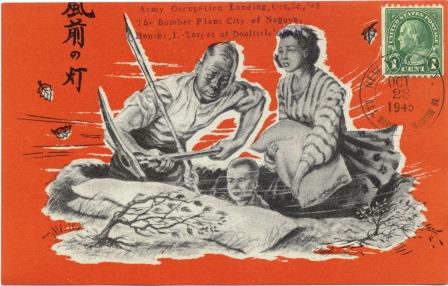
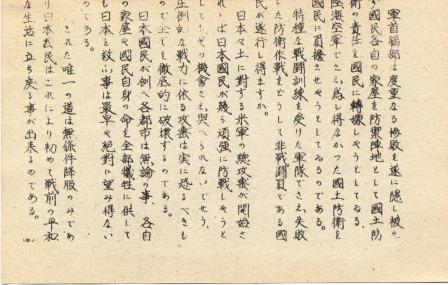
Translation of text on the back:
The military leaders [suffered?] repeated crushing defeats and began to defend the country by using their own houses as a defensive base. They are trying to hand over responsibility for the defense of the country to the people of the country. How could civilians, non-combatants, carry out a defense operation that had failed when an army with special combat training had failed? When the American army began its offensive against Japanese soil, no matter how stubbornly the Japanese people tried to defend themselves, no matter how hard they tried to defend themselves, they would not be able to [win?]. Attacks based on raw military power are truly frightening, and they completely destroy even the public. The people of Japan are now sacrificing their own lives, not to mention each city, and there is absolutely no hope of saving Japan. The only way left is to surrender unconditionally, and only then could the Japanese population be able to return to the peaceful life of the pre-war era.
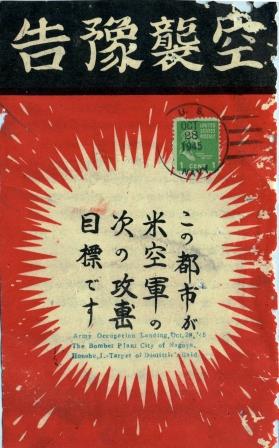
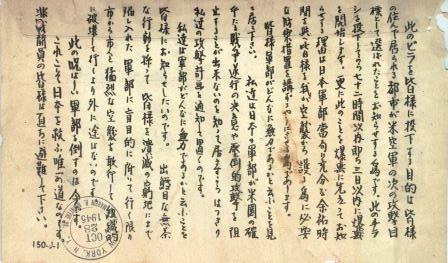
Translation of text on the back:
These leaflets are being dropped to notify you that your city has been listed for destruction by our powerful air force. The bombing will begin within 72 hours.
This advance notice will give your military ample time to take the necessary defensive measure to protect you from our inevitable attack. Watch and see how powerless they are to protect you.
We give the military clique this notification of our plans because we know there is nothing they can do to stop our overwhelming power and our iron determination. We want you to see how powerless the military is to protect you.
Systematic destruction of city after city will continue as long as you blindly follow your military leaders whose blunders have placed you on the very brink of extinction. It is your responsibility to overthrow the military government now and save what is left of your beautiful country.
In the meantime; we urge all civilians to evacuate at once.
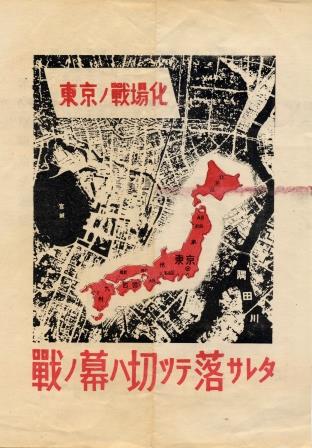
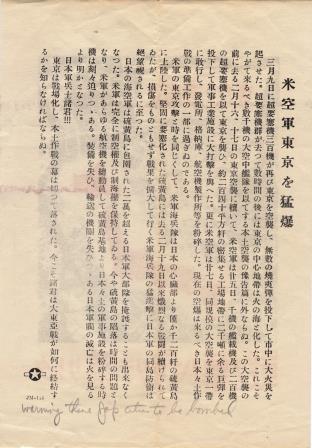
Translation of text on the front:
The Curtain has Dropped. War Starts.
Translation of text on the back:
AMERICAN AIR FORCE HITS TOKYO.
March 9th. 300 bombers air raided Tokyo again, dropping many incendiary bombs that caused huge fire all over the city.
A few hours after those planes left,central Tokyo become a sea of fire.
This is the warning of thousands of bomber attacking the main land of Japan in the near future.
Before this attack (3/9) Feb. 16/17’s bombing of Tokyo 1200, US Airforce hit a crowded factory area. They have dropped over 200 tons of bombs to military related factory and caused a big blow to them. And they came with the same scale of an attack on power plants, hangars, and an Air plane factory.
These attacks are part of upcomimg attacks to the main land.
While these attacks are happening, US Marines landed on Iwo Jima.
Iwo Jima was a stronghold, since Feb. 19 Marines have been conducting the ferocious attacks repeatedly. They keep attacking despite casuaities and are gaining their territory, the Japanese cannot fight back any longer.
Japanese air force and navy can no longer save the 20,000 force on this island because they are surrounded by Marines.
So the time is near that U.S. force will use this island as a base for attacks against all Japanese military facilities in main land Japan.
Losing the supply lines, losing capability of protection, foretelling Japanese military clique’s downfall.
Japanese Soldiers!!!
Tokyo became the battle field and it’s a begging of many attacks on the home land.
Now is the time you need to realize how this war will end.
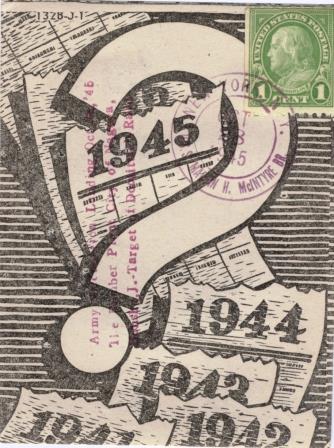

Translation of text:
How long will it last? What was the lowest point?
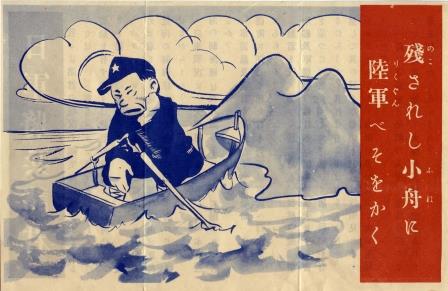
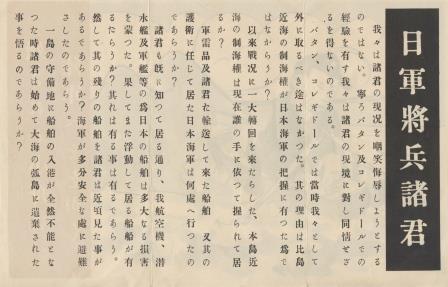
Translation of text on the front:
Left on the small boat, the Army weeps
Translation of the text on the back:
To Japanese Officers
We are not trying to insult or deride the present condition you are in. Rather, with our experiences on the Battle of Bataan as well as Corregidor, we can’t help but feel deep sympathy for you. At the time we didn’t have any other choices but the actions we took. The reason is that the Japanese Navy had control of the Ses of the Philippines. Since then, the reality of the battle has turned. Who do you think has control of the sea near Japan? The supply ships were coming to you with things you needed. Where are they now? You already know our air force, navy battleships, and submarines inflicted huge damages on the Japanese fleet. Is there a ship still active? There might be a few. But have you seen any lately? The navy probably harbors them in a safe port. You are deserted on the isolated island where no supply ship can come. Well you know this reality.
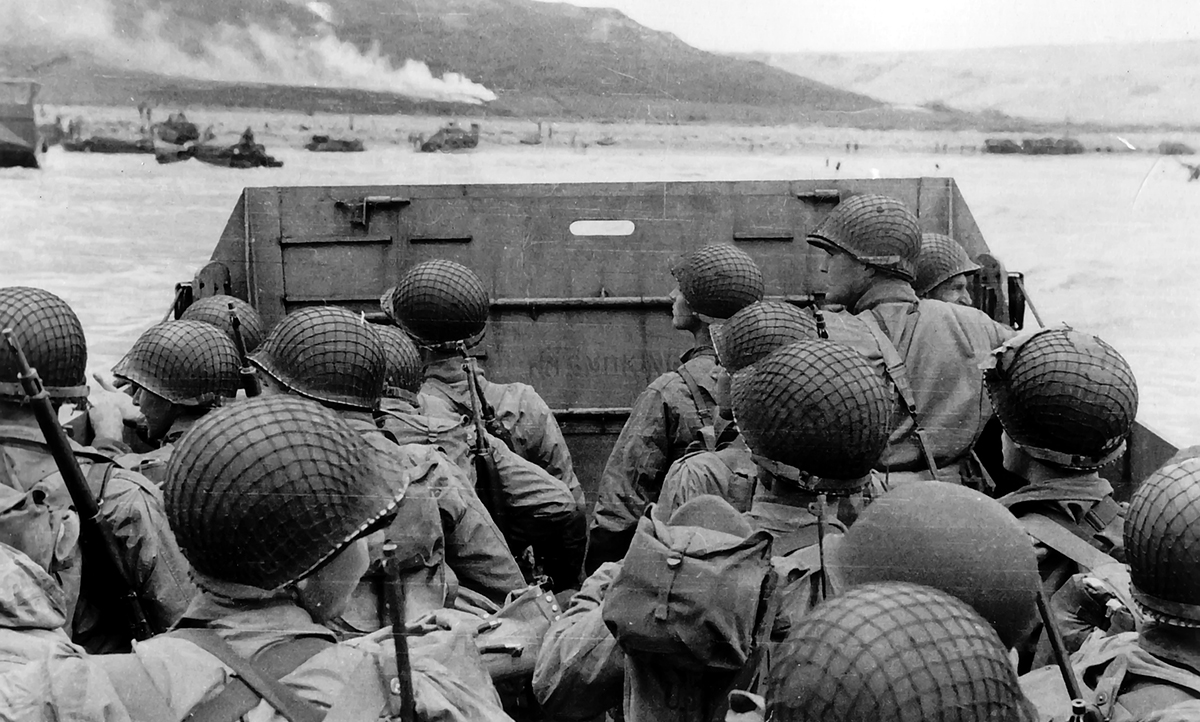
During WWI and WWI, war bonds were sold by the U.S. Treasury Department to help fund the war efforts. To promote the bonds and encourage their purchase by citizens, the government produced posters that would promote patriotism and stir pro-American feelings. Below are some of the official posters printed by the U.S. Government Printing Office; notice that each has a strong religious theme. For example, in the WWII posters, the enemy is attacking the Bible — the book that represented the heart and core of America and her beliefs and values. Notice that in the poster with President Franklin D. Roosevelt, a family is gathered around a cross. Others contain Bible themes and even point to the birth of Christ. Among the WWI posters is a mother and child offering a prayer, and an image of religious leader and hero Joan of Arc. Such messages, conveyed by the official mechanisms of the federal government, were never seen to be unconstitutional nor were they even questioned by citizens. To the contrary, Christian and Biblical principles were seen as indivisible from America.
World War II Posters
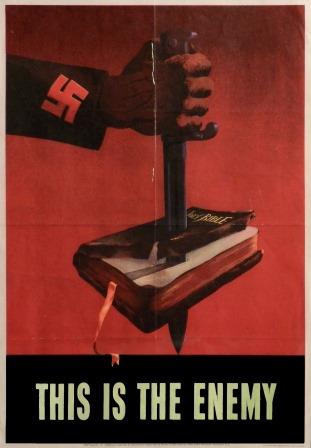
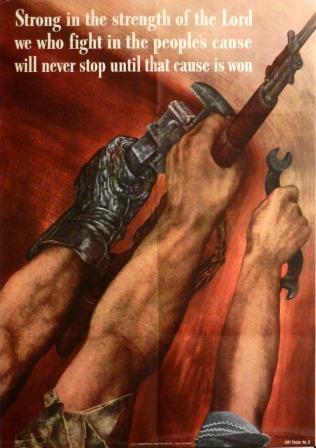
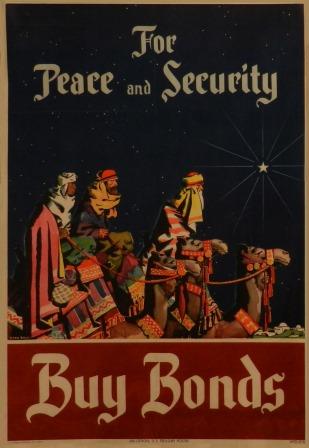
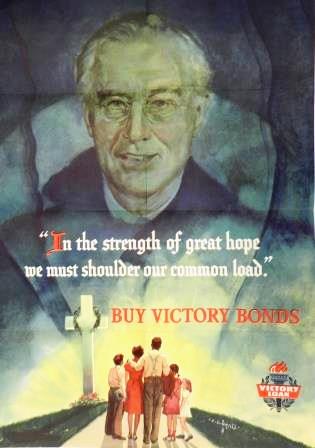
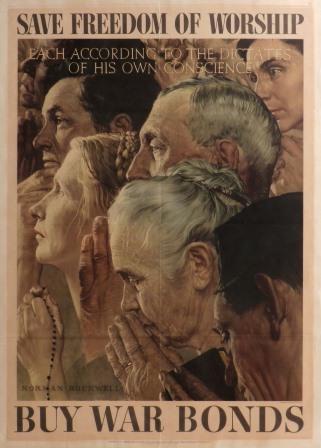
World War I Posters
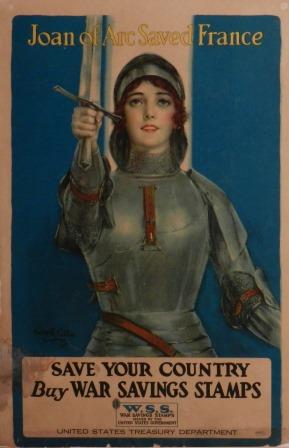
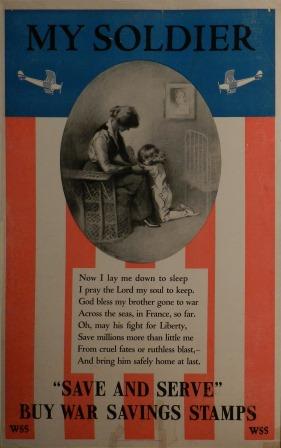
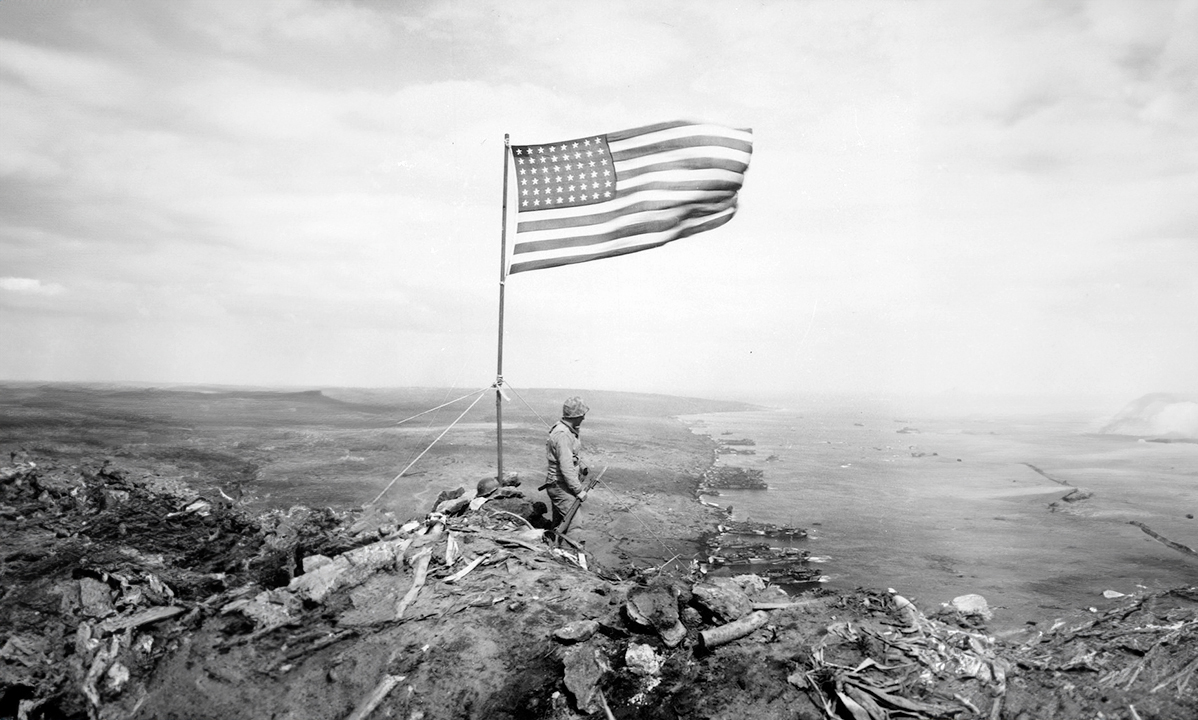
Sergeant John Basilone showed great heroism during his service in WWII. During the Campaign of Guadalcanal (August 1942-February 1943), he and his handful of men were responsible for holding back a Japanese assault on October 24-25, 1942. Throughout this engagement, he personally repaired and manned multiple machine guns. When his small detachment ran low, Basilone fought his way through the Japanese lines to resupply critically-needed ammunition. The Americans eventually won this long campaign. As a result of his actions, Basilone was awarded the Congressional Medal of Honor.
Later in the war at the Battle of Iwo Jima (February 19-March 26, 1945), Basilone came ashore with the first wave of Marines. Shortly after landing, his unit was trapped by machine guns from Japanese blockhouses. Basilone worked his way around one of these blockhouses and single-handedly destroyed it. As he was making his way towards an airfield, he came across an American tank trapped in a minefield. While under fire, he guided the tank out of the minefield and to safety. He was later killed by flying shrapnel. Basilone was awarded the Navy Cross for his courageous actions during the battle.
Below is a June 24, 1944 Collier’s magazine cover with a picture of Sergeant Basilone as well as a brief note by him.

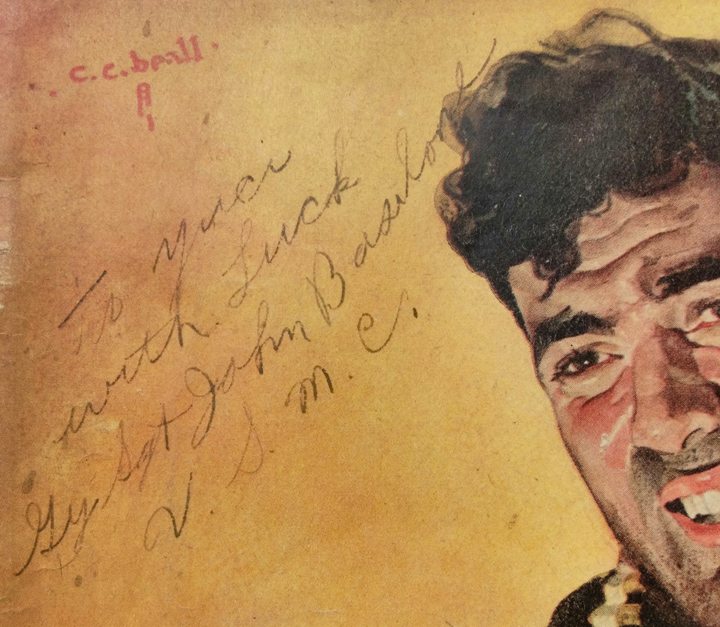
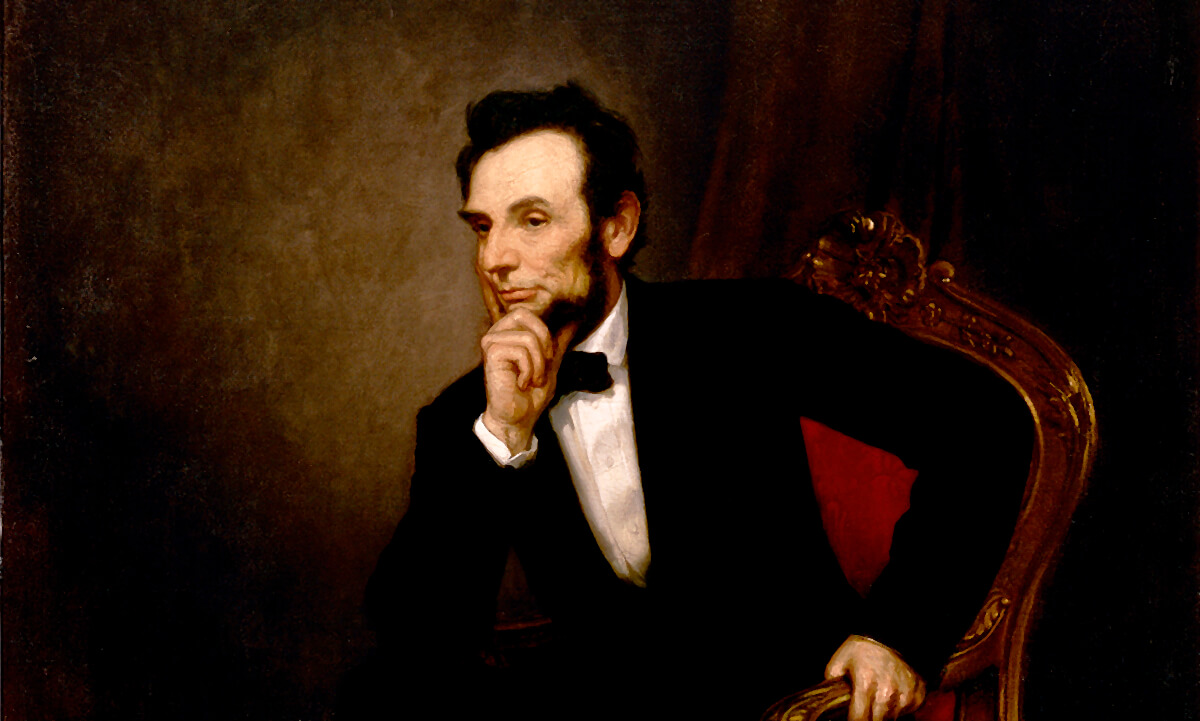
This is the text of Calvin Coolidge January 30, 1919 Lincoln Day Proclamation, issued as governor of Massachusetts.
Lincoln Day Proclamation
January 30, 1919
THE COMMONWEALTH OF MASSACHUSETTS
By His Excellency Calvin
Coolidge, Governor.
A PROCLAMATION
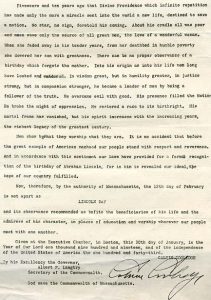 Fivescore and ten years ago that Divine Providence which infinite repetition has made only the more a miracle sent into the world a new life, destined to save a nation. No star, no sign, foretold his coming. About his cradle all was poor and mean save only the source of all great men, the love of a wonderful woman. When she faded away in his tender years, from her deathbed in humble poverty she dowered her son with greatness. There can be no proper observance of a birthday which forgets the mother. Into his origin as into his life men long have looked and wandered. In wisdom great, but in humility greater, in justice strong, but in compassion stronger, he became a leader of men by being a follower of the truth. He overcame evil with good. His presence filled the nation. He broke the might of oppression. He restored a race to its birthright. His mortal fame has vanished, but his spirit increases with the increasing years, the richest legacy of the greatest century.
Fivescore and ten years ago that Divine Providence which infinite repetition has made only the more a miracle sent into the world a new life, destined to save a nation. No star, no sign, foretold his coming. About his cradle all was poor and mean save only the source of all great men, the love of a wonderful woman. When she faded away in his tender years, from her deathbed in humble poverty she dowered her son with greatness. There can be no proper observance of a birthday which forgets the mother. Into his origin as into his life men long have looked and wandered. In wisdom great, but in humility greater, in justice strong, but in compassion stronger, he became a leader of men by being a follower of the truth. He overcame evil with good. His presence filled the nation. He broke the might of oppression. He restored a race to its birthright. His mortal fame has vanished, but his spirit increases with the increasing years, the richest legacy of the greatest century.
Men show by/ what they worship what they are. It is no accident that before the great example of American manhood our people stand with respect and reverence. And in accordance with this sentiment our laws have provided for a formal recognition of the birthday of Abraham Lincoln, for in him is revealed our ideal, the hope of our country fulfilled.
Now, therefore, by the authority of Massachusetts, the 12th day of February is set apart as
LINCOLN DAY
and its observance recommended as befit the beneficiaries of his life and the admirers of his character, in places of education and worship wherever our people meet with one another.
Given at the Executive Chamber, in Boston, this 30th day of January, in the Year of Our Lord one thousand nine hundred and nineteen, and of the independence of the United States of America the one hundred and forty-third.
Calvin Coolidge
By His Excellency the Governor,
Albert P. Langtry
Secretary of the Commonwealth.
God save the Commonwealth of
Massachusetts.
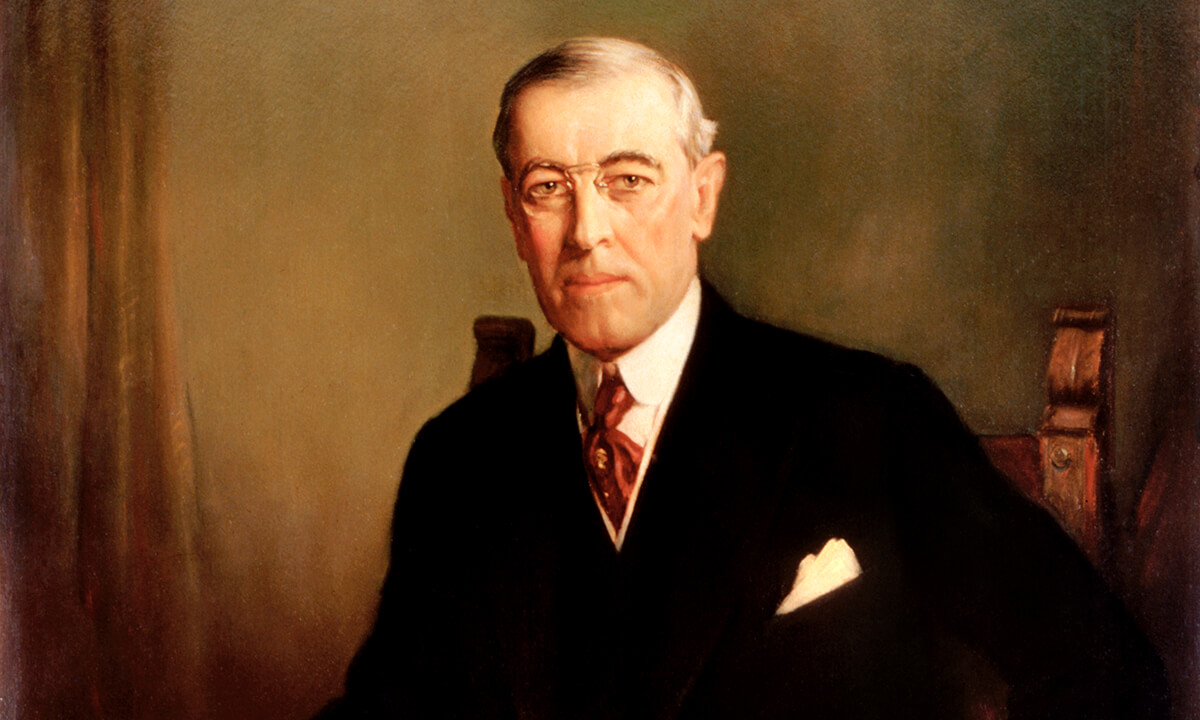
This is the text of a speech Woodrow Wilson gave on October 24, 1914 at Pittsburg. The title of the speech is “The Power of Christian Young Men.” The speech can be found in Selected Addresses and Papers of Woodrow Wilson (New York: Boni and Liverlight, Inc, 1918) pp. 49-55.
Mr. President, Mr. Porter, Ladies and Gentlemen:
I feel almost as if I were a truant, being away from Washington to-day, but I thought that perhaps if I were absent the Congress would have the more leisure to adjourn. I do not ordinarily open my office at Washington on Saturday. Being a schoolmaster, I am accustomed to a Saturday holiday, and I thought I could not better spend a holiday than by showing at least something of the true direction of my affections; for by long association with the men who have worked for this organization I can say that it has enlisted my deep affection.
I am interested in [this organization] for various reasons. First of all, because it is an association of young men. I have had a good deal to do with young men in my time, and I have formed an impression of them which I believe to be contrary to the general impression. They are generally thought to be arch radicals. As a matter of fact, they are the most conservative people I have ever dealt with. Go to a college community and try to change the least custom of that little world and find how the conservatives will rush at you. Moreover, young men are embarrassed by having inherited their father’s opinions. I have often said that the use of a university is to make young gentlemen as unlike their fathers as possible. I do not say that with the least disrespect for the fathers; but every man who is old enough to have a son in college is old enough to have become very seriously immersed in some particular business and is almost certain to have caught the point of view of that particular business. And it is very useful to his son to be taken out of that narrow circle, conducted to some high place where he may see the general map of the world and of the interests of mankind, and there shown how big the world is and how much of it his father may happen to have forgotten. It would be worth while for men, middle-aged and old, to detach them selves more frequently from the things that command their daily attention and to think of the sweeping tides of humanity.
Therefore I am interested in this association, because it is intended to bring young men together before any crust has formed over them, before they have been hardened to any particular occupation, before they have caught an inveterate point of view; while they still have a searchlight that they can swing and see what it reveals of all the circumstances of the hidden world.
I am the more interested in it because it is an association of young men who are Christians. I wonder if we attach sufficient importance to Christianity as a mere instrumentality in the life of mankind. For one, I am not fond of thinking of Christianity as the means of saving individual souls. I have always been very impatient of processes and institutions which said that their purpose was to put every man in the way of developing his character. My advice is: Do not think about your character. If you will think about what you ought to do for other people, your character will take care of itself. Character is a by-product, and any man who devotes himself to its cultivation in his own case will become a selfish prig. The only way your powers can become great is by exerting them outside the circle of your own narrow, special, selfish interests. And that is the reason of Christianity. Christ came into the world to save others, not to save himself; and no man is a true Christian who does not think constantly of how he can lift his brother, how he can assist his friend, how he can enlighten mankind, how he can make virtue the rule of conduct in the circle in which he lives. An association merely of young men might be an association that had its energies put forth in every direction, but an association of Christian young men is an association meant to put its shoulders under the world and lift it, so that other men may feel that they have companions in bearing the weight and heat of the day; that other men may know that there are those who care for them, who would go into places of difficulty and danger to rescue them, who regard them selves as their brother’s keeper.
And, then, I am glad that it is an association. Every word of its title means an element of strength. Young men are strong. Christian young men are the strongest kind of young men, and when they associate themselves together they have the incomparable strength of organization. The Young Men’s Christian Association once excited, perhaps it is not too much to say, the hostility of the organized churches of the Christian world, because the movement looked as if it were so nonsectarian, as if it were so outside the ecclesiastical field, that perhaps it was an effort to draw young men away from the churches and to substitute this organization for the great bodies of Christian people who joined themselves in the Christian denominations. But after a while it appeared that it [the YMCA] was a great instrumentality that belonged to all the churches; that it was a common instrument for sending the light of Christianity out into the world in its most practical form, drawing young men who were strangers into places where they could have companionship that stimulated them and suggestions that kept them straight and occupations that amused them without vicious practice; and then, by surrounding themselves with an atmosphere of purity and of simplicity of life, catch something of a glimpse of the great ideal which Christ lifted when He was elevated upon the cross.
I remember hearing a very wise man say once, a man grown old in the service of a great church, that he had never taught his son religion dogmatically at any time; that he and the boy’s mother had agreed that if the atmosphere of that home did not make a Christian of the boy, nothing that they could say would make a Christian of him. They knew that Christianity was catching, and if they did not have it, it would not be communicated. If they did have it, it would penetrate while the boy slept, almost; while he was unconscious of the sweet influences that were about him, while he reckoned nothing of instruction, but merely breathed into his lungs the wholesome air of a Christian home. That is the principle of the Young Men’s Christian Association to make a place where the atmosphere makes great ideals contagious. That is the reason that I said, though I had forgotten that I said it, what is quoted on the outer page of the program that you can test a modern community by the degree of its interest in its Young Men’s Christian Association. You can test whether it knows what road it wants to travel or not. You can test whether it is deeply interested in the spiritual and essential prosperity of its rising generation. I know of no test that can be more conclusively put to a community than that.
I want to suggest to the young men of this association that it is the duty of young men not only to combine for the things that are good, but to combine in a militant spirit. There is a fine passage in one of Milton’s prose writings which I am sorry to say I can not quote, but the meaning of which I can give you, and it is worth hearing. He says that he has no patience with a cloistered virtue that does not go out and seek its adversary. Ah, how tired I am of the men who are merely on the defensive, who hedge themselves in, who perhaps enlarge the hedge enough to include their little family circle and ward off all the evil influences of the world from that loved and hallowed group. How tired I am of the men whose virtue is selfish because it is merely self-protective! How much I wish that men by the hundred might volunteer to go out and seek an adversary and subdue him!
I have had the fortune to take part in affairs of a considerable variety of s us, and I have tried to hate, as few persons as possible but there is an exquisite combination of contempt and hate that I have for a particular kind of person, and that is the moral coward. I wish we could give all our cowards a perpetual vacation. Let them go off and sit on the side lines and see us play the game; and put them oft the field if they interfere with the game They do nothing but harm, and they do it by that most subtle and fatal thing of all, that of taking the momentum and the spirit and the forward dash out of things. A man who is virtuous and a coward has no marketable virtue about him. The virtue, I repeat, which is merely self-defensive is not serviceable even, I suspect, to himself For how a man can swallow and not taste bad when he is a coward and thinking only of himself I can not imagine.
Be militant! Be an organization that is going to do things! If you can find older men who will give you countenance and acceptable leadership, follow them: but if you can not, organize separately and dispense with them. There are only two sorts of men worth associating with when something is to be done. Those are young men and men who never grow old. Now, if you find men who have grown old, about whom the crust has hardened, whose hinges are stiff, whose minds always have their eye over the shoulder thinking of things as they were done, do not have anything to do with them. It would not be Christian to exclude them from your organization, but merely used them to pad the roll. If you can find older men who will lead you acceptably and keep you in countenance, I am bound as an older man to advise you to follow them. But suit yourselves. Do not follow people that stand still. Just remind them that this is not a statical proposition; it is a movement, and if they can not get a move on them they are not serviceable.
Life, gentlemen – the life of society, the life of the world – has constantly to be fed from the bottom. It has to be fed by those great sources of strength which are constantly rising in new generations. Red blood has to be pumped into it. New fiber has to be supplied. That is the reason I have always said that I believed in popular institution. If you can guess beforehand whom your rulers are going to be, you can guess with a very great certainty that most of them will not be fit to rule. The beauty of popular institutions is that you do not know where the man is going to come from, and you do not care so he is the right man. You do not know whether he will come from the avenue or from the alley. You do not know whether he will come from the city or the farm. / You do not know whether you will ever have heard that name before or not. Therefore you do not limit at any point your supply of new strength. You do not say it has got to come through the blood of a particular family or through the processes of a particular training, or by anything except the native impulses and genius of the man himself. /The humblest hovel, therefore, may produce you your greatest man. A very humble hovel did produce you one of your greatest men. That is the process of life, this constant surging up of the new strength of unnamed, unrecognized, uncatalogued men who are just getting into the running, who are just coming up from the masses of the unrecognized multitude. You do not know when you will see above the level masses of the crowd some great stature lifted head and shoulders above the rest, shouldering its way, not violently but gently, to the front and saying, “Here am I; follow me.” And his voice will be your voice, his thought will be your thought, and you will follow him as if you were following the best things in yourselves.
When I think of an association of Christian young men I wonder that it has not already turned the world upside down. I wonder, not that it has done so much, for it has done a great deal, but that it has done so little; and I can only conjecture that it does not realize its own strength. I can only imagine that it has not yet got its pace. I wish I could believe, and I do believe, that at 70 it is just reaching its majority, and that from this time on a dream greater even than George Williams ever dreamed will be realized in the great accumulating momentum of Christian men throughout the world. For, gentlemen, this is an age in which the principles of men who utter public opinion dominate the world. It makes no difference what is done for the time being. After the struggle is over the jury will sit, and nobody can corrupt that jury.
At one time I tried to write history. I did not know enough to write it, but I knew from experience how hard it was to find an historian out, and I trusted I would not be found out. I used to have this comfortable thought as I saw men struggling in the public arena. I used to think to myself, “This is all very well and very interesting. You probably assess yourself in such and such a way. Those who are your partisans assess you thus and so. Those who are your opponents urge a different verdict. But it does not make very much difference, because after you are dead and gone some quiet historian will sit in a secluded room and tell mankind for the rest of time just what to think about you, and his verdict, not the verdict of your partisans and not the verdict of your opponents, will be the verdict of posterity.” I say that I used to say that to myself. It very largely was not so. And yet it was true in this sense: If the historian really speaks the judgment of the succeeding generation, then he really speaks the judgment also of the generations that succeed it, and his assessment, made without the passion of the time, made without partisan feeling in the matter—in other circumstances, when the air is cool—is the judgment of mankind upon your actions.
Now, is it not very important that we who shall constitute a portion of the jury should get our best judgments to work and base them upon Christian forbearance and Christian principles, upon the idea that it is impossible by sophistication to establish that a thing that is wrong is right? And yet, while we are going to judge with the absolute standard of righteousness, we are going to judge with Christian feeling, being men of a like sort ourselves, suffering the same temptations, having the same weaknesses, knowing the same passions; and while we do not condemn, we are going to seek to say and to live the truth. What I am hoping for is that these seventy years have just been a running start, and that now there will be a great rush of Christian principle upon the strongholds of evil and of wrong in the world. Those strongholds are not as strong as they look. Almost every vicious man is afraid of society, and if you once open the door where he is, he will run. All you have to do is to fight, not with cannon but with light.
May I illustrate it in this way? The Government of the United States has just succeeded in concluding a large number of treaties with the leading nations of the world, the sum and substance of which is this, that whenever any trouble arises the light shall shine on it for a year before anything is done; and my prediction is that after the light has shone on it for a year it will not be necessary to do anything; that after we know what happened, then we will know who was right and who was wrong. I believe that light is the greatest sanitary influence in the world. That, I suppose, is scientific commonplace, because if you want to make a place wholesome the best instrument you can use is the sun; to let his rays in, let him search out all the miasma that may lurk there. So with moral light: It is the most wholesome and rectifying, as well as the most revealing, thing in the world, provided it be genuine moral light; not the light of inquisitiveness, not the light of the man who likes to turn up ugly things, not the light of the man who disturbs what is corrupt for the mere sake of the sensation that he creates by disturbing it, but the moral light, the light of the man who discloses it in order that all the sweet influences of the world may go in and make it better.
That, in my judgment, is what the Young Men’s Christian Association can do. It can point out to its members the things that are wrong. It can guide the feet of those who are going astray; and when its members have realized the power of the Christian principle, then they will not be men if they do not unite to see that the rest of the world experiences the same emancipation and reaches the same happiness of release.
I believe in the Young Men’s Christian Association because I believe in the progress of moral ideas in the world; and I do not know that I am sure of anything else. When you are after something and have formulated it and have done the very best thing you know how to do you have got to be sure for the time being that that is the thing to do. But you are a fool if in the back of your head you do not know it is possible that you are mistaken. All that you can claim is that that is the thing as you see it now and that you cannot stand still; that you must push forward the things that are right. It may turn out that you made mistakes, but what you do know is your direction, and you are sure you are moving in that way. I was once a college reformer, until discouraged, and I remember a classmate of mine saying, “Why, man, can’t you let anything alone?” I said, “I let everything alone that you can show me is not itself moving in the wrong direction, but I am not going to let those things alone that I see are going downhill”; and I borrowed this illustration from an ingenious writer. He says, “If you have a post that is painted white and want to keep it white, you cannot let it alone; and if anybody says to you, ‘Why don’t you let that post alone,’ you will say, ‘Because I want it to stay white, and therefore I have got to paint it at least every second year.'” There isn’t anything in this world that will not change if you absolutely let it alone, and therefore you have constantly to be attending to it to see that it is being taken care of in the right way and that, if it is part of the motive force of the world, it is moving in the right direction.
That means that eternal vigilance is the price, not only of liberty, but of a great many other things. It is the price of everything that is good. It is the price of one’s own soul. It is the price of the souls of the people you love; and when it comes down to the final reckoning you have a standard that is immutable. What shall a man give in exchange for his own soul? Will he sell that? Will he consent to see another man sell his soul? Will he consent to see the conditions of his community such that men’s souls are debauched and trodden under foot in the mire? What shall he give in exchange for his own soul, or any other man’s soul? And since the world, the world of affairs, the world of society, is nothing less and nothing more than all of us put together, it is a great enterprise for the salvation of the soul in this world as well as in the next. There is a text in Scripture that has always interested me profoundly. It says godliness is profitable in this life as well as in the life that is to come; and if you do not start it in this life, it will not reach the life that is to come. Your measurements, your directions, your whole momentum, have to be established before you reach the next world. This world is intended as the place in which we shall show that we know how to grow in the stature of manliness and of righteousness.
I have come here to bid Godspeed to the great work of the Young Men’s Christian Association. I love to think of the gathering force of such things as this in the generations to come. If a man had to measure the accomplishments of society, the progress of reform, the speed of the world’s betterment, by the few little things that happened in his own life, by the trifling things that he can contribute to accomplish, he would indeed feel that the cost was much greater than the result. But no man can look at the past of the history of this world without seeing a vision of the future of the history of this world; and when you think of the accumulated moral forces that have made one age better than another age in the progress of mankind, then you can open your eyes to the vision. You can see that age by age, though with a blind struggle in the dust of the road, though often mistaking the path and losing its way in the mire, mankind is yet sometimes with bloody hands and battered knees nevertheless struggling step after step up the slow stages to the day when he shall live in the full light which shines upon the uplands, where all the light that illumines mankind shines direct from the face of God.

General Omar Bradley (1893-1981) commanded the Twelfth Army Group during WWII and was the commander of Allied land forces invading Germany from the west. The following special orders were issued by five-star General Omar Bradley after Germany surrendered (May 8, 1945).
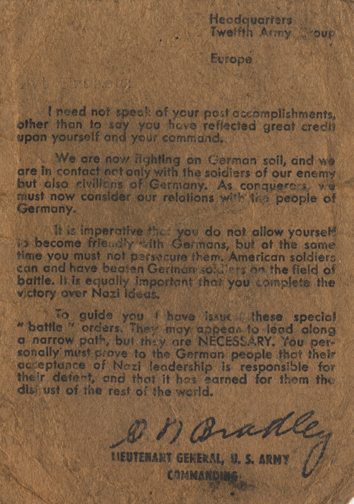
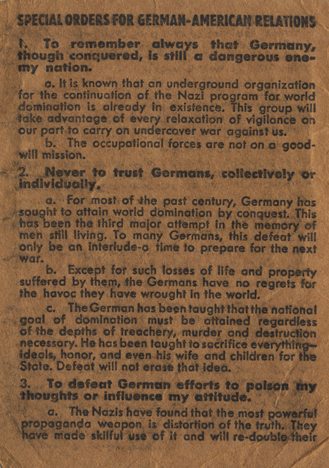
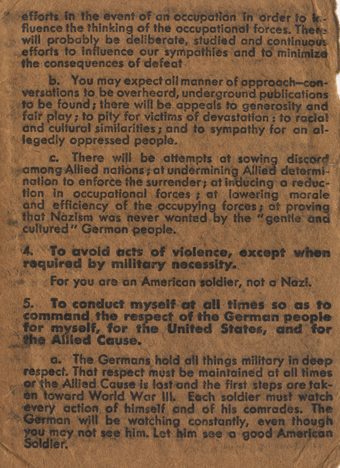
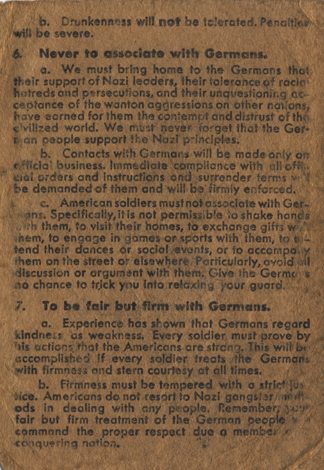
Headquarters
Twelfth Army Group
Europe
I need not speak of your past accomplishments, other than to say you have reflected great credit upon yourself and your command.
We are now fighting on German soil, and we are in contact not only with soldiers of our enemy but also civilians of Germany. As conquerors, we must now consider our relations with the people of Germany.
It is imperative that you do not allow yourself to become friendly with Germans, but at the same time you must not persecute them. American soldiers can and have beaten German soldiers on the field of battle. It is equally important that you complete the victory over Nazi ideas.
To guide you I have issued these special ” battle ” orders. They may appear to lead along a narrow path, but they are NECESSARY. You personally must prove to the German people that their acceptance of Nazi leadership is responsible for their defeat, and that it has earned for them the distrust of the rest of the world.
[signed] O N Bradley
LIEUTENANT GENERAL, U.S. ARMY
COMMANDING
SPECIAL ORDERS FOR GERMAN-AMERICAN RELATIONS
1. To remember always that Germany, though conquered, is still a dangerous enemy nation.
a. It is known that an underground organization for the continuation of the Nazi program for work) domination is already in existence. This group will take advantage of every relaxation of vigilance on our part to carry on undercover war against us.
b. The occupational forces are not on a good-will mission.
2. Never to trust Germans, collectively or individually.
a. For most of the past century, Germany has sought to attain world domination by conquest. This has been the third major attempt in the memory of men still living. To many Germans this defeat will only be on interlude – a time to prepare for the’ next war.
b. Except for such losses of life and property suffered by them, the Germans have no regrets for the havoc they have wrought in the world.
c. The German has been taught that the national goal of domination must be attained regardless of the depths of treachery, murder and destruction necessary. He has been taught to sacrifice everything— ideals, honor, and even his wife and children for the State. Defeat will not erase that idea.
3. To defeat German efforts to poison my thoughts or influence my attitude.
a. The Nazis have found that the most powerful propaganda weapon is distortion of the truth. They have mode skilful use of it and will re-double their efforts in the event of an occupation In order to influence the thinking of the occupational forces. There will probably be deliberate, studied and continuous efforts to influence our sympathies and to minimize the consequences of defeat.
b. You may expect ail manner of approach—conversations to be overheard, underground publications to be found; there will be appeals to generosity and fair play; to pity for victims of devastation : to racial end cultural similarities; and to sympathy for an allegedly oppressed people.
c. There will be attempts at sowing discord among Allied nations; of undermining Allied determination to enforce the surrender; at inducing a reduction in occupational forces; at lowering morale and efficiency of the occupying forces; at proving that Nazism was never wanted by the “gentle and cultured ‘ German people.
4. To avoid acts of violence, except when required by military necessity.
For you are on American soldier, not a Nazi.
5. To conduct myself at all times so as to command the respect of the German people for myself, for the United States, and for the Allied Cause.
a. The Germans hold all things military in deep respect. That respect must be maintained at all times or the Allied Cause is lost and the first steps are taken toward World War III. Each soldier must watch every action of himself and of his comrades. The German will be watching constantly, even though you may not see him. Let him see a good American Soldier.
b. Drunkenness will not be tolerated. Penalties will be severe.
6. Never to associate with Germans.
a. We must bring home to the Germans that their support of Nazi leaders, their tolerance of racial hatreds and persecutions, and their unquestioning acceptance of the wanton aggressions on other nations, have earned for them the contempt and distrust of the civilized world. We must never forget that the German people support the Nazi principles.
b. Contacts with Germans will be made only on official business. Immediate compliance with all official orders and instructions and surrender terms will be demanded of them and will be firmly enforced.
c. American soldiers must not associate with Germans. Specifically, it is not permissible to shake hands with them, to visit their homes, to exchange gifts with them, to engage in games or sports with them, to attend their dances or social events, or to accompany them on the street or elsewhere. Particularly, avoid all discussion or argument with them. Give the Germans no chance to trick you into relaxing your guard.
7. To be fair but firm with Germans.
a. Experience has shown that Germans regard kindness as weakness. Every soldier must prove by his actions that the Americans are strong. This will be accomplished if every soldier treats the Germans with firmness and stern courtesy at all times.
b. Firmness must be tempered with a strict justice. Americans do not resort to Nazi gangster methods in dealing with any people. Remember, your fair but firm treatment of the German people will command the proper respect due a member of a conquering nation.

The story of the four chaplains aboard the Dorchester is one that is not often repeated when recounting the events of WWII today. However, their heroism was well known and respected, as evidenced by this 1960 collectors card signed by Harry Truman commemorating the sacrifice of these brave men.
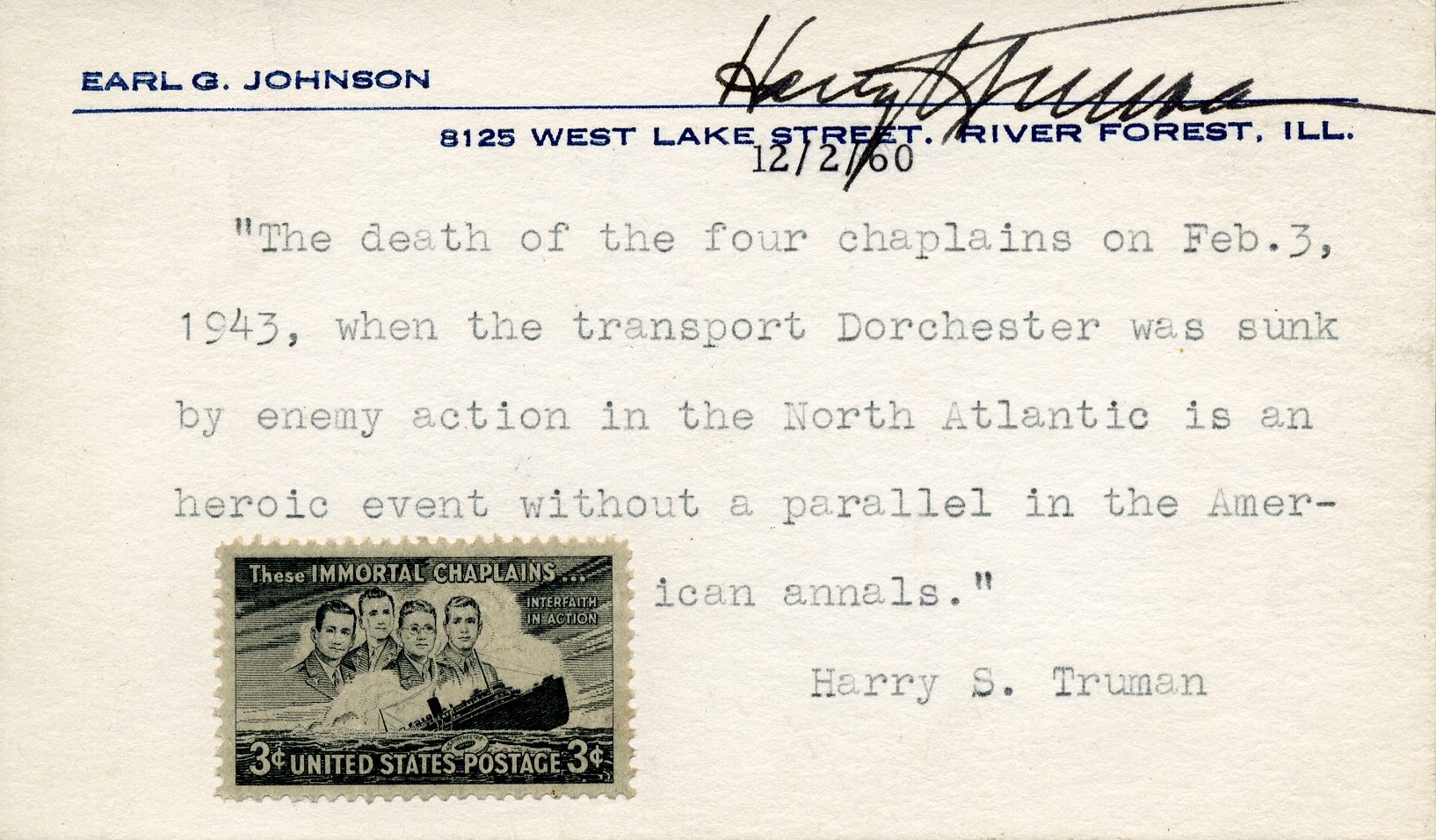
The death of the four chaplains on Feb. 3, 1943, when the transport Dochester was sunk by enemy action in the North Atlantic is an heroic event without a parallel in the American annals.